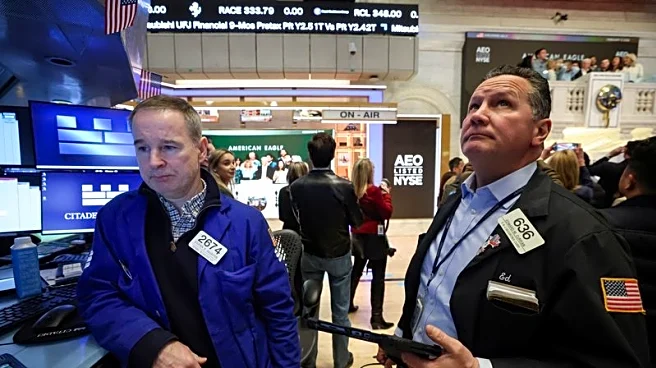What's Happening?
Warner Bros. has officially announced the development of Mortal Kombat III during a panel at the New York Comic Con. Screenwriter Jeremy Slater confirmed that he is currently working on the script for the third installment of the franchise. This announcement follows the success of Mortal Kombat II, which is set to release on May 16, 2026, after being delayed from its original fall 2025 date. Director Simon McQuoid explained the delay as a result of the film's positive reception during test screenings, which has generated significant momentum and anticipation. The cast of Mortal Kombat II, including Karl Urban, Adeline Rudolph, Tati Gabrielle, and Martyn Ford, joined Slater and McQuoid at the panel, highlighting the returning ensemble from the first movie.
Why It's Important?
The announcement of Mortal Kombat III signifies Warner Bros.' confidence in the franchise's enduring popularity and its potential to attract a large fanbase. The success of Mortal Kombat II and the decision to proceed with a third film underscores the franchise's impact on the entertainment industry, particularly in the realm of action and fantasy films. This development is likely to boost Warner Bros.' market position and contribute to the studio's revenue growth. Fans of the franchise stand to benefit from continued engagement with beloved characters and storylines, while the film industry may see increased competition in the action genre.
What's Next?
With the script for Mortal Kombat III underway, fans can anticipate further updates on casting, production timelines, and potential release dates. The success of Mortal Kombat II will likely influence the creative direction and marketing strategies for the third installment. Stakeholders, including Warner Bros., the cast, and the production team, will focus on maintaining the franchise's momentum and meeting audience expectations. The upcoming release of Mortal Kombat II will serve as a critical benchmark for the franchise's future trajectory.
Beyond the Headlines
The development of Mortal Kombat III may have broader implications for the film industry, including potential shifts in how action franchises are marketed and produced. The franchise's success could inspire other studios to invest in similar projects, potentially leading to a resurgence of interest in video game adaptations. Additionally, the cultural impact of Mortal Kombat, with its iconic characters and themes, may influence future storytelling trends in the action genre.












